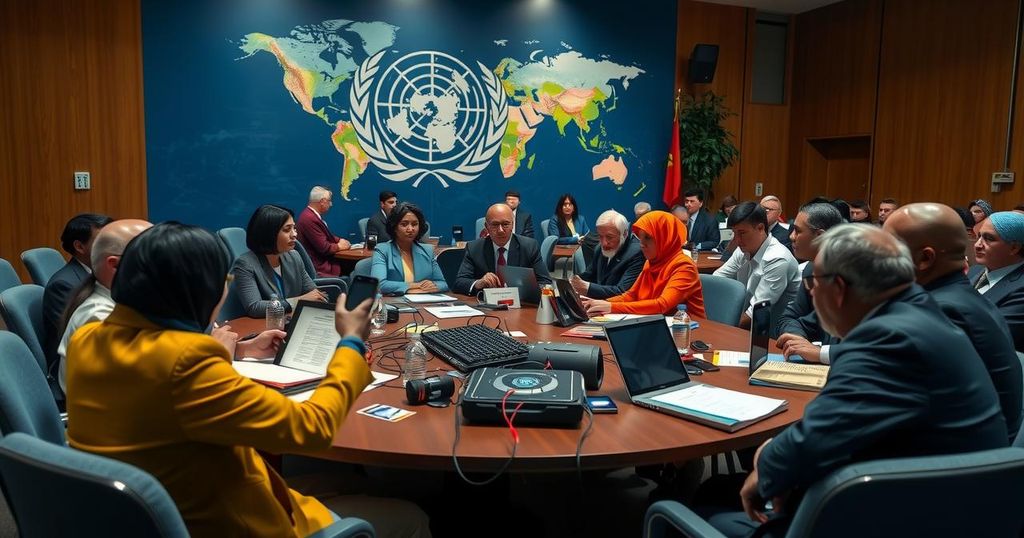UN Climate Talks Stall as Developing Nations Reject Financial Proposals

The UN climate talks face turmoil as developing nations reject current financial proposals intended for climate adaptation. High tension was evident as negotiators from poorer countries walked out, citing dissatisfaction with a rough draft that promises insufficient funding. Calls for a significant increase in climate finance, particularly from wealthy nations, highlight the urgency of addressing climate challenges as negotiations threaten to stall without a more inclusive and equitable approach.
Tensions escalated during the United Nations climate talks as negotiators from both developed and developing nations convened in an attempt to finalize an agreement regarding financial support for developing countries impacted by climate change. However, the circulating rough draft proposal faced considerable pushback, particularly from African nations and small island states, who ultimately walked out of negotiations due to dissatisfaction with the terms proposed. Evans Njewa, chair of the Least Developed Countries bloc, stated, “The current deal is unacceptable for us. We need to speak to other developing countries and decide what to do.” As discussions continued, activists outside the meeting criticized the U.S. for its inadequate contributions to combating climate change.
The latest proposed draft outlined a commitment of $250 billion annually by 2035, which is significantly higher than the prior $100 billion goal, but still falls short of the $1 trillion estimate deemed necessary by climate experts. The revised rough draft that was discussed included $300 billion in climate finance, yet it remained unconvincing to many developing nations, who expressed concern over receiving insufficient financial aid. Developing countries have called for approximately $1.3 trillion to support adaptive measures against the impacts of climate change, funding for loss and damages from extreme weather events, and transitioning towards sustainable energy resources.
Accusations emerged that wealthier nations were engaging in a war of attrition to influence negotiations to their advantage. Juan Carlos Monterrey Gomez, Panama’s chief negotiator, voiced frustration over the tactics employed by more affluent countries, stating, “Every minute that passes we are going to just keep getting weaker and weaker.” This sentiment echoed among various representatives from developing nations, who fear that ongoing delays will force them into accepting terms unfavorable to their environmental needs.
Discussions continue to reflect significant disparities between the aspirations of developing countries and the offers put forth by their wealthier counterparts. Emphasis was placed on the need for an inclusive process, with Teresa Anderson from ActionAid urging, “The U.S. in particular, and rich countries, need to do far more to show that they are willing for real money to come forward.” Ireland’s Environment Minister, Eamon Ryan, stressed that any reachable financial target at COP will require supplementary resources, indicating the high stakes that remain for climate finance negotiations.
Despite the challenges, some attendees maintained hopeful perspectives on the possibility of reaching an agreement before the conclusion of the talks. Nabeel Munir of Pakistan expressed optimism, indicating a willingness to engage positively if negotiation processes remain inclusive. However, the Alliance of Small Island States warned that their continued participation hinges on a fair negotiation process.
Overall, the talks’ outcomes will carry profound implications for future climate action, depending on whether tangible financial commitments can be secured to address the severe and immediate concerns posed by climate change for the world’s most vulnerable nations.
The ongoing UN climate talks represent a vital forum for nations to negotiate financial support aimed at combating climate change. Developing countries, heavily affected by climate-related disasters, rely on financial commitments from wealthier nations to transition to sustainable energy and adapt to changing environmental conditions. The urgency of addressing climate issues has intensified since the landmark Paris Agreement in 2015, which established obligations for developed nations to assist vulnerable countries economically. This current round of negotiations has highlighted significant disparities in the expectations of developing nations compared to the proposals from wealthier counterparts, leading to heightened tensions and a potential stalemate in discussions.
In conclusion, the United Nations climate talks are currently marked by significant discord among negotiating parties, particularly between developed and developing nations. Rejecting the rough draft proposals, delegations from vulnerable countries have demanded more substantial commitments to meet their climate adaptation needs. The ongoing discussions underscore the urgency for wealthy nations to fulfill their previously established obligations, as any finalized financial agreement will have far-reaching implications for global climate action. Without an inclusive approach that prioritizes the needs of developing countries, it remains uncertain whether a viable solution can be achieved.
Original Source: www.voanews.com






